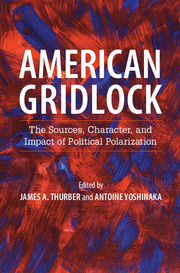Book contents
- Frontmatter
- Dedication
- Contents
- List of contributors
- Foreword
- Acknowledgments
- Introduction
- PART I POLARIZATION AMONG VOTERS AND ACTIVISTS
- 1 The New American Electorate: Partisan, Sorted, and Polarized
- 2 Redistricting and Polarization
- 3 Party Activists, Interest Groups, and Polarization in American Politics
- 4 Authoritarianism and Polarization in American Politics, Still?
- 5 Party Sorting: The Foundations of Polarized Politics
- PART II POLARIZATION IN NATIONAL INSTITUTIONS
- PART III POLARIZATION IN THE STATES
- PART IV POLARIZATION IN THE MEDIA
- PART V IMPLICATIONS AND CONCLUSIONS
- Index
- References
4 - Authoritarianism and Polarization in American Politics, Still?
from PART I - POLARIZATION AMONG VOTERS AND ACTIVISTS
Published online by Cambridge University Press: 05 November 2015
- Frontmatter
- Dedication
- Contents
- List of contributors
- Foreword
- Acknowledgments
- Introduction
- PART I POLARIZATION AMONG VOTERS AND ACTIVISTS
- 1 The New American Electorate: Partisan, Sorted, and Polarized
- 2 Redistricting and Polarization
- 3 Party Activists, Interest Groups, and Polarization in American Politics
- 4 Authoritarianism and Polarization in American Politics, Still?
- 5 Party Sorting: The Foundations of Polarized Politics
- PART II POLARIZATION IN NATIONAL INSTITUTIONS
- PART III POLARIZATION IN THE STATES
- PART IV POLARIZATION IN THE MEDIA
- PART V IMPLICATIONS AND CONCLUSIONS
- Index
- References
Summary
• A personality based, authoritarian-nonauthoritarian, divide continues to structure party conflict in America, providing it with the characteristics of polarization.
• Barack Obamae's ascendancy to the presidency, in fact, has deepened the divide we identified as emerging in the early 2000s.
• The issue agenda, which is central to understanding personality-based polarization, has evolved in ways that have also deepened the divide, particularly with the emergence of immigration reform as a central concern.
• The Tea Party represents the clearest embodiment of the authoritarian politics that defines the current political right, pushing a substantive issue agenda but also eliciting deeper-seated emotions about order and change in American politics.
Our book, Authoritarianism and Polarization in American Politics, was published in 2009 (Hetherington and Weiler 2009). In it, we argued that politics had increasingly become organized around a fundamental worldview/personality divide. This was because peoplee's preferences about many of the most important issues of the day – race, feminism, immigration, gay rights, and the proper responses to terrorism – are all, in large measure, driven by the same worldview/personality characteristic. We called that characteristic authoritarianism, although scholars have used many terms to describe those with the outlook we identified. Given the timing of our booke's release, the most up-to-date data we could employ were gathered during the 2008 primary season. Much about politics has changed since then. Moreover, some of the new developments might suggest the critical change in the partisan divide that we identified then could have turned out to be more a blip in history than the durable worldview evolution we diagnosed.
Critics might, for example, identify the election of Barack Obama, the first African-American president, as evidence that the importance of race, the first layer of the process of worldview evolution that we argued was occurring, had been resolved. In addition, the issue agenda changed dramatically after Obamae's election, with matters involving foreign wars and terrorism less pronounced than they were during the Bush administration. Because our original analysis had suggested the central importance of the September 11, 2001, terrorist attacks in forging the new worldview divide, the diminishing importance of such issues could, in turn, reduce authoritarianisme's effect in structuring party conflict. Similarly, gay rights, another key issue we identified in defining the worldview divide, is perhaps on its way to resolution.
- Type
- Chapter
- Information
- American GridlockThe Sources, Character, and Impact of Political Polarization, pp. 86 - 112Publisher: Cambridge University PressPrint publication year: 2015
References
- 7
- Cited by

